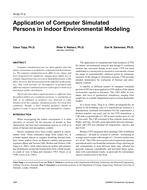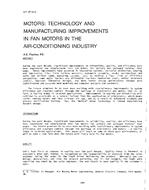Energy modeling and optimization studies can facilitatethe design of cost-effective, low-energy buildings. However,this process inevitably involves uncertainties such as predictingoccupant behavior, future climate, and econometricparameters. As presently practiced, energy modelers typicallydo not quantify the implications of these unknowns into performanceoutcomes. This paper describes an energy modelingapproach to quantify economic risk and better inform decisionmakers of the economic feasibility of a project. The proposedmethodology suggests how economic uncertainty can be quantifiedwithin an optimization framework. This approachimproves modeling outcomes by factoring in the effect of variabilityin assumptions and improves confidence in simulationresults. The methodology is demonstrated using a net zeroenergy commercial office building case study located inLondon, ON, Canada.
Citation: 2016 Winter Conference, Orlando, FL, Transactions 2016, Vol 122 pt. 1
Product Details
- Published:
- 2016
- Number of Pages:
- 11
- Units of Measure:
- Dual
- File Size:
- 1 file , 900 KB
- Product Code(s):
- D-OR-16-035


